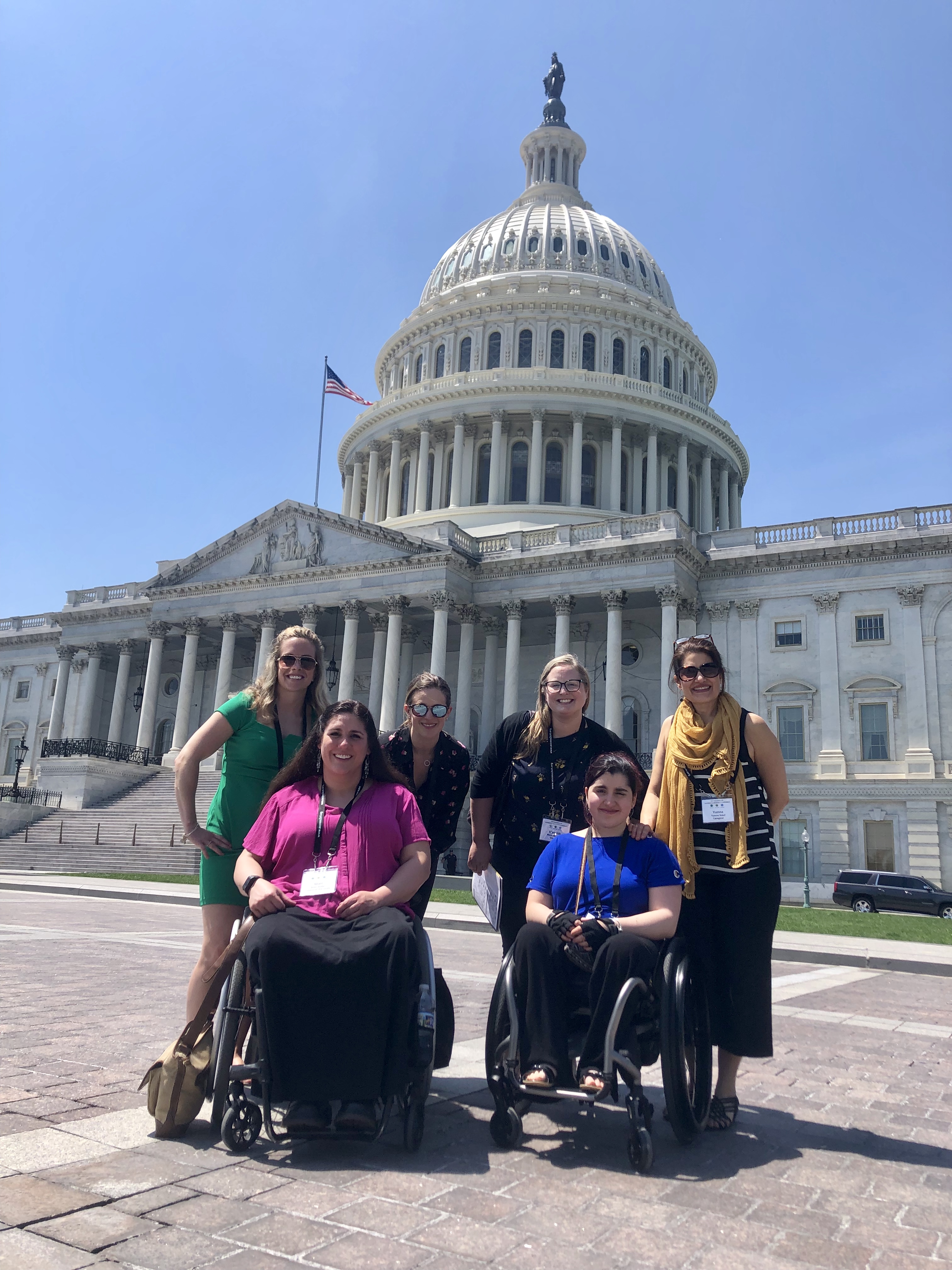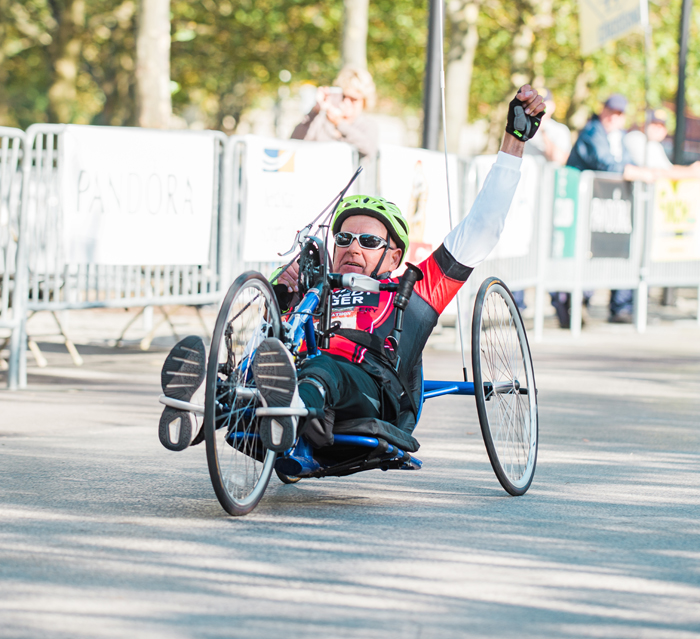Letter from Dr. Sadowsky:
We hope you’re enjoying a summer of fun, relaxation and soaking up warm weather. This summer, some of our patients and their families participated in an adaptive sailing event around Baltimore’s Inner Harbor. Soon, a group of patients will hit the waves in the annual Life Rolls On adaptive surfing event in Virginia Beach, Virginia. We’re also gearing up for the annual Baltimore Running Festival!
It’s not all fun and games at the International Center for Spinal Cord Injuries (ICSCI). Several Kennedy Krieger Institute staff members are participating in a Centers for Disease Control work group to aid in the ongoing investigation to decipher the cause and treatment of acute flaccid myelitis.
We’re also working to secure legislation that improves access and care for individuals with spinal cord injuries. In our new regular feature, “Advocacy Spot,” you’ll find important information about legislation that will directly impact you.
Enjoy the rest of your summer, and stay hydrated—it’s so important in the hot summer months for everyone, but especially those with a spinal cord injury!
Live a happy life and make it matter!
Advocacy Spot:
Welcome to the Advocacy Spot! We’ll share today’s hot topics in legislation that impact access to services, equipment or the community. We hope to motivate you to advocate, promote change and protect your rights! Every day, people are advocating for you, but your voices and your stories make the greatest impact. Keep reading for more about legislation that affects access to wheelchairs, air travel, and long-term supports and services.
Access to Customized Wheelchairs
Currently, highly customized, configurable manual and power wheelchairs and adaptive seating and positioning systems (equipment known as complex rehabilitation technology, or CRT) are included in the same category as standard durable medical equipment (DME).

However, CRT and DME are not alike, as CRT is individualized for each user. Reimbursement under the DME category does not account for the level of technology used, the skill and hours needed to evaluate someone for such a device, the full range of services furnished by companies that provide these products, the training required to ensure proper use, or the complexity and unique nature of this equipment. Plus, coverage for DME is constantly being cut, which leads to poor funding for CRT.
Without separation from the DME category, access to CRT equipment is threatened. We’re seeing an impact in product choice and a decline in access to service for repairs or maintenance of this equipment. Every day, larger companies are buying out product suppliers, or they are forced to close their doors.
Currently, there are two important bills related to access to CRT:
- Ensuring Access to Quality Complex Rehabilitation Technology Act of 2019, H.R. 2408:
- a. Introduced by Representatives Jim Sensenbrenner (R‐WI) and Brian Higgins (D‐NY)
- b. Meant to separate CRT from the DME category to allow for needed improvements in coverage policies, payment coding and quality standards
- c. There is no companion bill in the Senate, yet. Stay tuned, as we are actively working on finding senators to take the lead on this bill.
- Protecting Access to Wheelchairs Act, H.R. 2293/Protecting Beneficiary Access to Complex Rehabilitation Technology Act, S. 1223:
- a. Introduced by Representatives John Larson (D-CT) and Lee Zeldin (R-NY) and Senators Robert Casey (D-PA) and Robert Portman (R-OH)
- b. Medicare has applied inappropriate pricing and reimbursement to critical components/accessories (backrests, cushions, positioning devices, etc.) for custom manual wheelchairs
- c. Meant to facilitate congressional action to stop the application of this inappropriate pricing to these components and improve end-user access
- d. The House Bill (H.R. 2293) has been included in a larger bill (HEARTS and Rural Relief Act, H.R. 3429, introduced by Terri Sewell [D-AL] and Devin Nunes [R-CA]), which has been approved to go up for vote! We are hoping this will happen within the next few months. Stay tuned!
Visit the Access 2 CRT website for more information about the status of each bill above. This website also provides a simple link to email your congressional representative, with email drafts you can modify and personalize.
Are you a wheelchair user? If so, we need your help! We need more congressional support for each bill. You can help by reaching out to your congressional representative directly and sharing your stories of how your wheelchair improves your independence, health and quality of life. Share your stories of how poor access to equipment has negatively impacted you (like missing work or school, being stuck at home, getting a pressure sore, etc.).
Air Travel Rights
The Air Carrier Access Act (ACAA) was signed into law more than 30 years ago. However, as you may know, significant barriers still affect air travel, such as damaged wheelchairs, delayed assistance or lack of seating accommodations. Many of these difficulties are not sufficiently addressed by the ACAA.
The Air Carrier Amendments Act of 2019, S. 669 and H.R. 1549, introduced by Senator Tammy Baldwin (D-WI) and Representative Jim Langevin (D-RI), is meant to address these issues by strengthening enforcement of the ACAA, requiring airlines to meet defined accessibility standards for newly built airplanes, properly training staff members, modifying current planes and improving the overall safety of air travel for passengers with disabilities.
Disability Integration Act (DIA), S. 117 and H.R. 555:
This bill is meant to protect the rights of people who require long-term care services and supports. In summary, this bill serves to ensure that people have the choice to receive long-term care services either in long-term care facilities OR in their homes. In other words, if a service is provided in a long-term care facility, it should also be offered in the person’s home.
Again, we’re looking to get more co-sponsors signed on with these bills for a greater potential of getting them passed. If you have a story to share about your airline travel experience and/or about long-term care needs versus your wish to stay in your home and community, please share them with your congressional representatives!
For more information, please visit the United Spinal Association Advocacy Center where you can easily find your local congressional representative and get tips for how to effectively communicate with congressional offices.
We encourage you to get involved. You can play a significant role simply by educating someone on how these issues impact your daily life, or by making personal connections with your congressional offices.
Baltimore Running Festival Participation:

Be sure to register for Kennedy Krieger Institute’s Baltimore Running Festival team to join our eighth year of participation. The Baltimore Running Festival takes place on October 19. With your help, this year we could reach the impressive figure of $1,000,000 in donations since we started racing!
Do you want to support Team Kennedy Krieger in its efforts to raise funds for therapy equipment and other programs, but you’ll be out of town or physically unable to participate on race day? You can still help us reach our goal by participating as a virtual racer, agreeing to raise $100 for Team Kennedy Krieger without racing! Virtual racer registrants still make a difference. As a virtual racer, you get all the Team Kennedy Krieger benefits except those specific to race-day participation.
Visit the Team Kennedy Krieger website to learn more or to register. Help us hit a million!
Publications and Presentations:

Participation in national conferences allows staff members to learn and network with colleagues in the field of spinal cord rehabilitation all around the world. We’re able to share our insights and therapeutic approaches with others in the field.
Here are some of the conferences at which our staff members recently presented on a variety of topics:
- ICSCI staff members presented at the 2019 ASIA SCI Summit Annual Scientific Meeting in Waikiki, Hawaii, April 2–5, 2019.
- “Point – Counter Point: Bone Health,” led by Dr. Cristina Sadowsky, MD, and her colleagues
- “Acute Flaccid Myelitis in Children: Epidemiology, Diagnosis, Medical Management, and Rehabilitation Outcomes,” presented by Cristina Sadowsky, MD; Kaitlin MacDonald, OT; Michelle Melicosta, MD, MPH, FAAP; and Suzanne Rybczynski, MD
- “A Retrospective Randomized Study comparing the effectiveness of using the Braden Scale to predict Pressure Injuries (PrI) in patients with Spinal Cord Injury (SCI),” presented by Marjorie Morgan, PTA, CLT; Quyen Catania, PT, DPT, CWS, CLT; and Rebecca Martin, OTR/L, OTD
- “Feasibility and Potential Efficacy of TSCS on lower extremity recovery and walking function in patients with ISCI,” presented by Liza McHugh, DPT, PT; Ashley A. Miller, DPT, PT; and Rebecca Martin, OTR/L, OTD
- ICSCI hosted a two-day continuing education course, “Progress in Practice: Activity-Based Restorative Therapy,” at Prisma Health in Columbia, South Carolina, April 27–28, 2019. Twenty-five healthcare professionals attended this workshop, led by Rebecca Martin, OTR/L, OTD; Beth Farrell, PT, DPT, PCS, ATP/SMS; and Brooke Meyer, PT, DPT, to gain clinical knowledge to implement activity-based restorative therapy techniques with their patients with neurological deficits.
Here are recently published papers by ICSCI staff members:
- “Effects of Drugs on Bone Metabolism in a Cohort of Individuals with Traumatic Spinal Cord Injury,” published in Spinal Cord Series and Cases in January 2019 by Cristina Sadowsky, MD, and Marjorie Morgan, PT, CLT, and coauthored by colleagues at The Johns Hopkins University
- “Acute flaccid myelitis: Rehabilitation challenges and outcomes in a pediatric cohort,” accepted for publication in the Journal of Pediatric Rehabilitation Medicine in March 2019 and awaiting official publication. Janet Dean, MS, RN, CRRN, CRNP; Cristina Sadowsky, MD; Courtney Porter PT, DPT; Kaitlin MacDonald, OT; Michelle Melicosta, MD, MPH, FAAP; Kathleen Oppenheimer; and Cynthia Salorio, PhD, coauthored this new research.
- A multi-center paper, “Tracking Spinal Cord Injury Functional Outcomes Across the Lifespan: Validation of Linking Coefficients,” published online in May 2019, by Cristina Sadowsky, MD, along with her colleagues from four other premier pediatric centers. https://www.ncbi.nlm.nih.gov/pubmed/31153853
Awards
The following ICSCI staff members were recognized by their peers at Kennedy Krieger’s medical staff awards ceremony in June:
- Cristina Sadowsky, MD, received the Dr. Arabella Leet Award in Clinical Excellence from her peers at Kennedy Krieger
- Janet Dean, MS, RN, CRRN, CRNP, received the Excellence in Clinical Care by a Nurse Practitioner award
Regeneration Generation 2019—Monthly Meeting Schedule
Join us for the upcoming Regeneration Generation meetings. Every month, a speaker presents a new and interesting topic, presentation or discussion. This group is open to all individuals living with paralysis, as well as their family members, friends and caregivers.
Meetings begin at 12:15 p.m. on the dates listed below. All meetings are catered and held at:
Kennedy Krieger Institute
801 North Broadway
Conference Room 202
Baltimore, MD 21205
Meeting Topics for 2019
- August 27: Understanding Benefits/Finance
- September 24: Sexuality, Women’s and Men’s Health
- October 22: Self Care/Adapted Dance and Sports
Please note: Meetings will not be held in November and December.
Your Support Changes Lives:
Did you know you can support the International Center for Spinal Cord Injury with a philanthropic gift? We have two funds at the Center: the Hope Fund and our research fund. The Hope Fund helps individuals with spinal cord injuries who qualify for need-based assistance to cover some of the costs associated with treatment (e.g. transportation, lodging, co-pays, etc). The second fund supports research related to spinal cord injuries conducted by faculty within the center. Research helps the team develop new and improved technology and test new clinical interventions in order to provide the best care possible.

